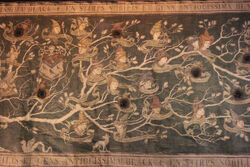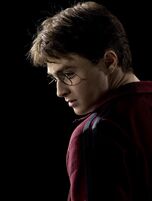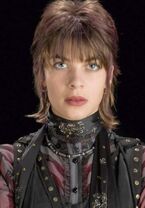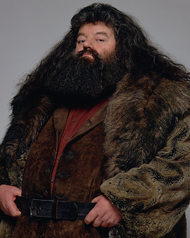Tags: Visual edit apiedit |
PolarMountie (talk | contribs) m (→Squibs: Spelling correction; Argus Filch is not a squid, he's a squib.) Tags: Visual edit apiedit |
||
| (2 intermediate revisions by one other user not shown) | |||
| Line 122: | Line 122: | ||
{{Main|Squib}} |
{{Main|Squib}} |
||
| − | {{Quote|Squibs were usually shipped off to Muggle schools and encouraged to integrate into the Muggle community… much kinder than trying to find them a place in the wizarding world, where they must always be second class |
+ | {{Quote|Squibs were usually shipped off to Muggle schools and encouraged to integrate into the Muggle community… much kinder than trying to find them a place in the wizarding world, where they must always be second class....|[[Muriel]] talking to Harry Potter about squibs|Harry Potter and the Deathly Hallows}} |
| − | [[File:Mainfulcd.jpg|thumb|215x215px|[[Argus Filch]], a |
+ | [[File:Mainfulcd.jpg|thumb|215x215px|[[Argus Filch]], a squib ]] |
Squibs are individuals from wizarding families but have no magic themselves. One example is Argus Filch, who is so embarrassed by this that he hides it from students and studies magic fruitlessly in his spare time.<ref name="JKR" /> Another example is [[Arabella Figg]], who does not seem to particularly care that she has no skill in magic. Squibs appear to keep in contact with wizarding society, whereas Muggles have little to no contact, as they don't know it even exists. |
Squibs are individuals from wizarding families but have no magic themselves. One example is Argus Filch, who is so embarrassed by this that he hides it from students and studies magic fruitlessly in his spare time.<ref name="JKR" /> Another example is [[Arabella Figg]], who does not seem to particularly care that she has no skill in magic. Squibs appear to keep in contact with wizarding society, whereas Muggles have little to no contact, as they don't know it even exists. |
||
| Line 141: | Line 141: | ||
{{Quote|Filthy half-breeds! Beasts! Uncontrolled animals!|[[Dolores Umbridge]] to a group of [[centaur]]s|Harry Potter and the Order of the Phoenix}} |
{{Quote|Filthy half-breeds! Beasts! Uncontrolled animals!|[[Dolores Umbridge]] to a group of [[centaur]]s|Harry Potter and the Order of the Phoenix}} |
||
| − | [[File:Main.jpg|left|thumb|204x204px|[[Fleur Delacour]], |
+ | [[File:Main.jpg|left|thumb|204x204px|[[Fleur Delacour]], part-Veela]] |
Half-breeds are humans with at least one non-human parent, although witches and wizards with non-human ancestry further back would also be considered half-breeds. They are very rare and have traits of both species, such as the ability to use [[magic]] and [[spell resistance]] in half-[[giant]]s. Prejudice against half-breeds appears to be relatively common in the wizarding world, which is [[Wikipedia:Speciesism#In fiction|intolerant]] toward non-human peoples in general.<ref name="GOF">''[[Harry Potter and the Goblet of Fire]]''</ref> |
Half-breeds are humans with at least one non-human parent, although witches and wizards with non-human ancestry further back would also be considered half-breeds. They are very rare and have traits of both species, such as the ability to use [[magic]] and [[spell resistance]] in half-[[giant]]s. Prejudice against half-breeds appears to be relatively common in the wizarding world, which is [[Wikipedia:Speciesism#In fiction|intolerant]] toward non-human peoples in general.<ref name="GOF">''[[Harry Potter and the Goblet of Fire]]''</ref> |
||
| Line 148: | Line 148: | ||
====Known half-breed types==== |
====Known half-breed types==== |
||
| + | [[File:Rubeus hagrid.PNG|thumb|238x238px|[[Rubeus Hagrid]], half-gaint]] |
||
{| class="wikitable" border="1" width="65%" |
{| class="wikitable" border="1" width="65%" |
||
|- |
|- |
||
Revision as of 21:56, 26 August 2015

Pure-blood House of Black's family tree
- "You place too much importance, and you always have done, on the so-called purity of blood! You fail to recognise that it matters not what someone is born, but what they grow to be!"
- — Albus Dumbledore to Cornelius Fudge[src]
Blood Status,[1] also named Purity of Blood,[2] is a concept in the wizarding world that distinguishes between family trees that have different levels of magically-endowed members. It often results in prejudice towards those who have a large number of Muggles in their families. Wizarding society in general considers itself apart from and superior to Muggle society, which is not connected with magic. As Sirius Black informed Harry Potter, almost all wizards of their time have Muggles in their family trees, though some claim not to. The concept played a key role in both the First and Second Wizarding Wars. In truth, pure-blood families have ceased to exist during the 1900s.
Levels of blood purity
Muggle-borns
- "Mudblood's a really foul name for someone who is Muggle-born — you know, non-magic parents. There are some wizards — like Malfoy's family — who think they're better than everyone else because they're what people call pure-blood… I mean, the rest of us know it doesn't make any difference at all."
- — Ron Weasley explaining blood prejudice to Hermione Granger and Harry Potter[src]
Hermione Granger, a Muggle-born witch
Those born to Muggle families but who are skilled with and have the magic gene are referred to as Muggle-borns. A child born with magic to two Muggle parents is considered a Muggle-born. In wizarding Britain, they are allowed to attend Hogwarts School of Witchcraft and Wizardry, although some other schools, such as Durmstrang Institute, only admit students with wizarding heritage. Salazar Slytherin fell out of favour with the other Founders of Hogwarts because he wanted to limit attendance on the same grounds.
Those with prejudice against Muggles and their families often refer to such wizards as "Mudbloods," a highly offensive term implying that the individual has dirty and inferior blood. Those who discriminate against Muggle-borns believe that they do not deserve magic and should be excluded from the wizarding world, in spite of the fact that Muggle-borns are just as magically talented as those of other blood statuses.[3]
When the Ministry of Magic fell under the indirect control of Lord Voldemort during the Second Wizarding War, it began distributing propaganda against "Mudbloods" under the authorship of Dolores Umbridge. Muggle-borns were also forced to register with the Ministry's Muggle-Born Registration Commission, which accused Muggle-borns of having stolen their wands and sentenced them to Azkaban.[1] This ended once Voldemort was defeated and the Ministry was reformed.
Half-bloods
- "Most wizards these days are half-blood anyway. If we hadn't married Muggles we'd've died out."
- — Ron Weasley on the wizarding population[src]

Harry Potter, a half-blood wizard

Nymphadora Tonks, a half-blood witch
Wizards with families split between Muggles and wizards are referred to as half-bloods. Due to the dominance of the magic gene, children born to at least one magical parent will usually be magical themselves, meaning that a non-magical child born to a Muggle and a wizard is considered a Squib, not a Muggle:[4] the term 'half-blood' is misleading in that it does not necessarily imply a half-and-half split in wizarding/Muggle ancestry, but rather any witch or wizard with both wizarding and Muggle heritage. By the 1990s, most of the magical population were half-bloods.
The ancestry of a half-blood can be:
| Parantage | Wizard |
|---|---|
| Pure or half-blood parent & Muggle parent | Lord Voldemort |
| Severus Snape | |
| Dean Thomas | |
| Seamus Finnigan | |
| Pure or half-blood parent & Muggle-born | Harry Potter |
| Nymphadora Tonks | |
| Albus Dumbledore | |
| Two magical parents, known Muggle ancestry | Teddy Lupin |
| James Potter II | |
| Albus Potter | |
| Lily Potter II |
The children of Harry and Ginny Potter are considered half-bloods because of Harry's parentage — pure-blood father, Muggle-born mother.
The term can be an insult, depending on the context in which it is used. Walburga Black, for instance, was a fervent believer in pure-blood supremacy and her portrait at 12 Grimmauld Place often screamed "filthy half-bloods" and other insults at passers-by somewhat indiscriminately, which points to the mania surrounding blood purity. Bellatrix Lestrange was also known to have insulted Harry Potter[5] and Severus Snape on the basis of their half-blood heritage.[6]
Some half-bloods also express prejudice against those with Muggle ancestry, despite having it themselves, often clinging to what wizarding heritage they do have. Lord Voldemort, the son of a pure-blood witch, Merope Gaunt and a Muggle Tom Riddle Sr., epitomises this. He hated Muggles and Muggle-borns and held his status as the Heir of Slytherin in great esteem.[6]
Pure-bloods
- Hagrid: "See, the thing is, Harry, there're some wizards, like the Malfoy family, who think they're better'n everyone else because they’re what people call 'pure-blood'."
- Harry Potter: "That's horrible!"
- Hagrid: "And it's codswallop, to boot. 'Dirty blood.' Why, there isn’t a wizard alive today that’s not half-blood or less."
- — Rubeus Hagrid and Harry Potter discussing blood purity[src]
Draco Malfoy, a pure-blood wizard and future Death Eater
Pure-bloods are wizards and witches with a family tree devoid of Muggle members, or at least, they have convinced themselves of this by removing any non-pure-bloods from their family trees.[7] At the very least, one must have all magical grandparents to be considered pure-blood, though extremists would require no known Muggle ancestors. Thus, some would consider the children of Harry and Ginny Potter to be pure-bloods because all four of their grandparents — James and Lily Potter, as well as Arthur and Molly Weasley — were wizards and witches. Others, however would consider them half-bloods because their paternal grandmother was Muggle-born, thus they have known Muggle ancestry.
Many pure-bloods consider themselves to be akin to royalty in the wizarding world, or at the very least the elite. They often disdain those of different blood status and Muggles, some even arguing that Muggle-borns should not be admitted into the wizarding world. The Death Eater organisation took this philosophy to an extreme, striving to eliminate Muggle-borns altogether.
To be pure-blood is an uncommon trait and their numbers continue to decline over time. There appears to be a continuous stream of new families entering the wizarding world as children from non-wizarding backgrounds with magical ability and as a result those with long pure-blood lines are relatively rare. To maintain their "pure-blood pedigree", families such as the House of Black and the House of Gaunt have practised inbreeding, accounting for the mental instability of certain family members.[7] Those same families tend to disown members who accept Muggles or Muggle-born wizards into their lives. These family members would be deemed "blood traitors". For instance, the Blacks commonly blasted these relatives off the family tree tapestry.[5]
Mental Disorders
- "The pure-blood families are all interrelated. If you’re only going to let your sons and daughters marry pure-bloods your choice is very limited; there are hardly any of us left."
- — Sirius Black referring to how all pure-blood families are related[src]
Inbreeding can cause mental disorders, which can possibly be the reason for both Bellatrix Lestrange and Tom Riddle's sadistic personalities. They are known for their psychopathic tendencies and inability to feel compassion towards others whom they regard as inferior (i.e. Muggle-born wizards and the Muggle population in general.) A large number of Death Eaters partake in torture of other fellow wizards and witches, to the point of persecution and outright extermination, simply based upon their blood-status. It's possibly due to the centuries of inter-mingling that might have damaged their brains and bodies as was the case with the Gaunts.
Deterioration of their minds was overlooked because they had kept the proper pedigree praised by Salazar Slytherin and all those who followed his standards of what made a good or worthy Wizard/Witch.
Known instances of inbreeding
| Wizard(s) | Reason |
|---|---|
| Orion Black | Sirius and Regulus's parents are second cousins. |
| Walburga Black | |
| House of Black | Black family tree spans seven centuries, so there is probably more inbreeding in that family than is known. |
| House of Gaunt | According to Dumbledore, the House of Gaunt has many inbred relatives, causing their instability. |
| Harry Potter | They might in fact be third cousins, which would cause their children to be inbred. This has been unconfirmed, as they might just be third cousins by marriage (Charlus Potter might be Harry Potter's great-uncle and not his grandfather). |
| Ginny Weasley | |
| Victoire Weasley | They are fourth cousins once removed. They were romantically involved in 2017, but it is unknown if they eventually had children. If they did, it would technically be inbreeding, though very distantly (and thus, unlikely to cause any problems). As well as not being illegal. |
| Teddy Lupin | |
| Arthur Weasley | They are second cousins by marriage once removed, which is not technically inbreeding, but shows how the spouses are somewhat interrelated. Going back more generations might show some actual biological links. |
| Molly Weasley |
Squibs

Argus Filch, a squib
Squibs are individuals from wizarding families but have no magic themselves. One example is Argus Filch, who is so embarrassed by this that he hides it from students and studies magic fruitlessly in his spare time.[4] Another example is Arabella Figg, who does not seem to particularly care that she has no skill in magic. Squibs appear to keep in contact with wizarding society, whereas Muggles have little to no contact, as they don't know it even exists.
Squibs are generally looked upon with disdain by most wizards and witches. Even families like the Weasleys, who do not look down on Muggles or Muggle-borns, are rather embarrassed to have a Squib, who works as an accountant, in their family. Neville Longbottom's family was also upset at the prospect that he might be a Squib and repeatedly tried to scare accidental magic out of him when he was a child.
Squibs are able to use magical devices, such as magic detectors, or other items whose magical capabilities are inherent, but not devices such as wands, which require magical abilities in the user.
Muggle-borns are descended from Squibs who married into muggle families.
It is possible that a child or later descendent of Hector Dagworth-Granger, a famous potioneer, was a Squib, because Horace Slughorn stated to Hermione Granger that the two could have been related. This could be possible if magic in a family dies out.
Half-breeds
- "Filthy half-breeds! Beasts! Uncontrolled animals!"
- — Dolores Umbridge to a group of centaurs[src]

Fleur Delacour, part-Veela
Half-breeds are humans with at least one non-human parent, although witches and wizards with non-human ancestry further back would also be considered half-breeds. They are very rare and have traits of both species, such as the ability to use magic and spell resistance in half-giants. Prejudice against half-breeds appears to be relatively common in the wizarding world, which is intolerant toward non-human peoples in general.[2]
"Half-breed" may be an insulting, rather than proper, term. It is known to be highly offensive to centaurs, though this may only be because it is in fact incorrect: centaurs are their own non-human breed, rather than a mix of species.[5]
Known half-breed types

Rubeus Hagrid, half-gaint
|
Types |
Percentage |
Wizard(s) |
|---|---|---|
| Part-giant | half | Rubeus Hagrid |
| Olympe Maxime | ||
| Part-Veela | half | Apolline Delacour |
| quarter | Fleur Delacour | |
| Gabrielle Delacour | ||
| Part-goblin | unkown | Filius Flitwick |
Interrelation
It is stated all "pure-blood" families are interrelated. This would mean (even if pure-blood families exist) all families are interrelated. All half-bloods have at least 1 pure-blood ancestor from a pure blood family (thus pure-bloods and half-bloods are related). Muggle-borns are children of Muggles and have the magic gene because of a squib, half-blood or pure-blood ancestor. Squibs are born into half-blood/pure-blood families but do not possess the power to use magic (though they are carriers of the gene). Half-breeds are half-bloods/pure-bloods with a non-human ancestor. Muggles can become related and produce half-blood children when mixed with half-bloods/pure-bloods. A muggle may marry a squib and their descendants know nothing until the gene resurfaces randomly.
Behind the scenes
- There are many parallels to the notion of blood purity that exist in the Muggle world, largely in the form of racism. Examples of this being manifested include the Ku Klux Klan, Afrocentrism, a belief that all life began in Africa and thus Blacks are the superior race and should only marry other Blacks,discrimination against immigrants and the persecution and mass murder of Jews, Roma, Slavs, so-called "Mischlings" and others by the Nazis known as the Holocaust. Adolf Hitler, promoting a society with a "pure Aryan race," is rumoured to have had a Jewish ancestor.
- A more direct parallel, however, is the formation of blood purity laws and the infamous Spanish Inquisition in Medieval Spain to regulate the activities of Spanish conversos (converts to Christianity from Judaism and Islam). These conversos, although officially equal to their Christian brethren, were nonetheless scrutinized and even persecuted: if a converso showed any hint of heresy or apostasy, they would be subjected to auto-da-fé.
- J. K. Rowling consciously drew such parallels: “The expressions ‘pure-blood’, ‘half-blood’ and ‘Muggle-born’ have been coined by people to whom these distinctions matter, and express their originators' prejudice. As far as somebody like Lucius Malfoy is concerned, for instance, a Muggle-born is as ‘bad’ as a Muggle. Therefore Harry would be considered only ‘half’ wizard, because of his mother's parents. If you think this is far-fetched, look at some of the real charts the Nazis used to show what constituted ‘Aryan’ or ‘Jewish’ blood...the Nazis used precisely the same warped logic as the Death Eaters. A single Jewish grandparent 'polluted' the blood, according to their propaganda.”[7]
- Another direct parallel between blood purity and Harry Potter has been seen in the American Mafia. According to the code of the mafia, only men who are full-blooded Italian, meaning bot parents are full Italian and can prove familial ancestry extending to Italy, are eligible to become "made men", or gain full-fledged mafioso status. In actuality, the American Mafia has found it increasingly difficult to adhere to those standards due to the large amount of immigration and intermarriages in the United States. Famous American mobster John Gotti, for instance, was born to a Serbian mother and an Italian father, and should not have been made according to his own standards. Newer mafia code has said that men who can prove Italian ancestry through patrilineal descent (father's side) are eligible to get made.
- As in the Harry Potter universe, these parallels in Muggle society have caused great strife, suffering and cruelty in society.
- An interesting fact of note is that despite the ideals that pure-bloods are inherently more powerful wizards, some of the most powerful or particularly adept wizards and witches in the series are in fact either half-blood (such as Lord Voldemort, Albus Dumbledore, Minerva McGonagall, Severus Snape and Harry Potter) or Muggle-born (such as Hermione Granger and Lily Evans).
- There is probably no such thing as true blood purity any longer. This is because several pure-blood families have either died out, or mated with Muggles.
Appearances
- Harry Potter and the Philosopher's Stone (First mentioned)
- Harry Potter and the Chamber of Secrets (Mentioned only)
- Harry Potter and the Goblet of Fire (Called Purity of Blood)
- Harry Potter and the Deathly Hallows (First identified as Blood status)
- J. K. Rowling Official Site (Mentioned only)
Notes and references
- ↑ 1.0 1.1 Harry Potter and the Deathly Hallows
- ↑ 2.0 2.1 Harry Potter and the Goblet of Fire
- ↑ Harry Potter and the Chamber of Secrets
- ↑ 4.0 4.1 "Squibs" at J.K. Rowling's Official Site
- ↑ 5.0 5.1 5.2 Harry Potter and the Order of the Phoenix
- ↑ 6.0 6.1 Harry Potter and the Half-Blood Prince
- ↑ 7.0 7.1 7.2 F.A.Q. Section at J.K. Rowling's Official Site
